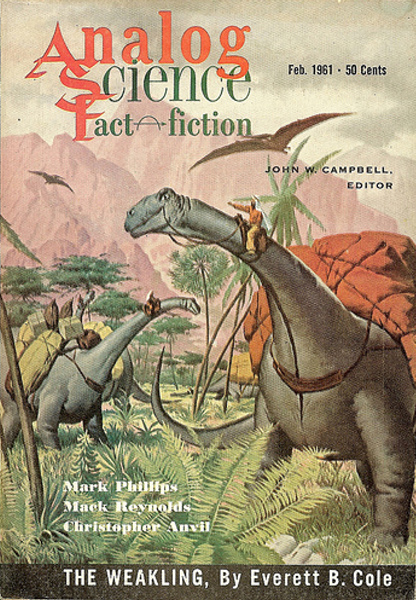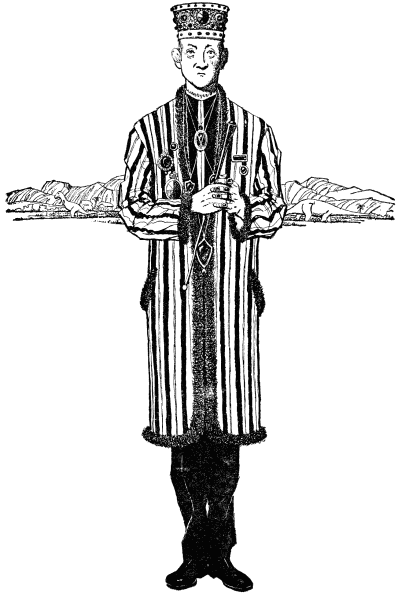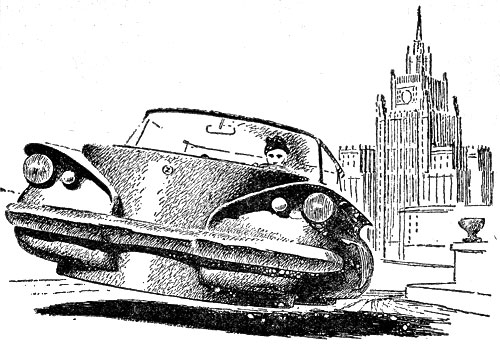
John Campbell's science fiction magazine continues to defy my efforts to chart a trend. Following on the heels of last month's rather dismal issue, the February 1961 Analog is an enjoyable read. Let's take a look, shall we?
It took me a little while to get into Everett Cole's lead novella, The Weakling, but once I understood what he was doing, I was enthralled. Cole paints a world in which people with psi powers dominate those without. It is a planet of slave-owning aristocrats who can force people to do their bidding through mental will alone. The viewpoint character is Barra, scion of a noble family. His ascension to lordhood was accidental, caused by the premature deaths of his father and brother. Without the aid of an array of potent psychic enhancers, he would be barely more powerful than the "pseudo-men" he controls.

Weakling is the account of this bitter, cruel man, contemptuous of the slaves he resembles, jealous of his psychically more powerful peers, who entices rich merchants to his estate, murdering them for plunder. The story can be hard to read at times, but it is an excellent insight into the mindset of the 19th Century slave-owner (and thus an indictment of the sentiment that still prevails over much of the modern South). Four stars.
Teddy Keller's short, The Plague, is more typical Analog fare. When a sickness sweeps the nation, with no apparent rhyme or reason to its epidemiology, one doctor must race against time to find a cure. The solution is contrived and rather silly. Two stars.
Freedom, the latest in Mack Reynolds' slew of stories set in the Soviet Union of the 1980s, is a horse of a different color. Once again, Reynolds expertly conveys the character of life behind an Iron Curtain where Communism has achieved its economic goals, but not its social ones. In this tale, we see how difficult it is to extirpate a desire for intellectual freedom once it has taken root. I appreciate the evenhandedness with which Reynolds evaluates both the East and West. I also liked the romantic element, portrayed as between two equals unencumbered with conservative moral values. Four stars.

Campbell trumpeted his expanded coverage of science fact in his magazine, and it seemed a worthy experiment at the start. I'm always happy to see more Asimov articles, after all. But recently, the "non-fiction" portion of the magazine has been devoted to self-penned articles on the editor's hobbies or favorite crackpot inventions. We get a blessed break from these with a short photo-feature showing rockets of the past and present. Too short to garner a rating.
I don't think I quite got H.B. Fyfe's The Outbreak of Peace, a short short that takes place at an interstellar peace conference. I even read it twice. Would someone explain it to me, please? Two stars (for now).
At last, we have Chris Anvil's latest, The Ghost Fleet. A space fleet commander is forced to ignominious flight when the enemy strikes with an unbeatable weapon. Can he recover his honor (and save the day) with an audacious gambit? It's good, if something of a one-trick pony. Three stars.
The issue finishes off with the conclusion to Occasion for Disaster, which I previously covered. All told, the book clocks in at a slice over three stars, which is perfectly acceptable for 50 cents of entertainment.
Now let's see if this month's Fantasy and Science Fiction can top that.

I was unable to get into the Cole at all. I could see what he was trying to do and it wasn't badly written, but it just didn't grab me. Maybe it was the psi stuff (Campbell's crackpottery is infecting the fiction he publishes, too).
I liked "The Plague" a little better than you did. Admittedly, it was a bit light for a story of even its short length and the romance didn't really seem all that plausible, but I thought the infection vector was rather clever.
The Reynolds was top-notch and I agree with everything you said.
Fyfe puzzled me as well. The best I can come up with is that he's playing off of the concept of "winning the peace". Other than that, all I can do is shrug and hope somebody else can explain it to us.
The Anvil was all right, I suppose, but I largely forgot everything about shortly after finishing it. It wasn't a waste of my time, but it was all that satisfying either.
As for the serial, well psi again. Sigh. I still haven't read it. I might give it a go, but as is usually the case after Christmas, my To Read pile is pretty high.
The Fyfe: So here we have a tale of two superpowers maintaining a carefully balanced and even semi-cordial but perpetually ongoing state of war. Every move is considered carefully so as not to incite all-out hostilities; when prisoners of war are taken, they are well-treated and even rewarded with small luxuries, casualties are kept to a minimum wherever possible, even the number of spies on each side is kept meticulously balanced. Actual capture of territory is done through inciting local populations of indigenous people to revolt or riot, though this is a closely-held secret.
I think it could have been better-written, but this struck me strongly as a parody of the relationship between the Soviet Union and the U.S., the need to keep things balanced, the working through intermediaries, etc. And I think the "point" is that the state of war has been maintained so long, that the two superpowers literally know nothing else and see no other way to live – a perception deliberately maintained by those in power and those with something to gain by continuing the "war".
That sounds right. Thanks for such an articulate explanation.
I could see that becoming an interesting TV-show episode.
I enjoyed the Cole very much. Good work on the villain, and the 'shoot out' was very well done. I can see why you compare the psionics to the Confederation, beside the slave owning you just know their higher tech, more urbanised enemies are going to end up rolling over them.
I liked the Anvil, too. I'm a Sutcliff fan, and there certainly is a touch of that here. Plus, his 'morals of the story' are worth hearing.
As others say better, it seemed to me that in the Fyfe war was simply an opening ploy in a political struggle. Another very well written one.
The only story I think poorly written is the Keller. The actual answer (which must have been accidental, since it was so unexploited by the enemy) was reasonable, but none of the surroundng story added to it.
Cole did a much better job than Garrett when the latter took on the subject matter.
And I'm certainly pleased to have a good Mack Reynolds to read. Thank you! From this author, Simonov's going renegade was a surprise twist, and a good one. I'm convinced by this near future, and I love the word dawddling. Dawdling and twaddling are so often mixed.
I had the same trouble getting into "The Weakling" that you did. I think this may be because the flashback structure was somewhat confusing. The story was also a bit long, and there was a little too much repetition of some points. However, the background was interesting, and the ending was very good. I don't think this was quite so much an allegory of the Confederacy as much as the theme of "power corrupts" in any place and time.
"The Plague" — One idea joke story, and fairly clever. Not great literature, but a diverting bagatelle.
"Freedom" — A very strong story, and one which extrapolates the current (very modest) liberalization in the Soviet Union and its satellites into a hopeful future, without ignoring the fact that achieving this state will be neither easy nor bloodless.
My take on "The Outbreak of Peace" is that it is meant to contrast the caution of the Cold War (exaggerated here into a very polite form of "war") with the fierce negotiations that happen during "peacetime."